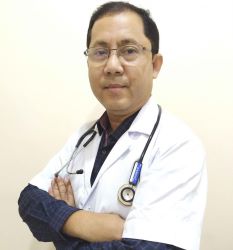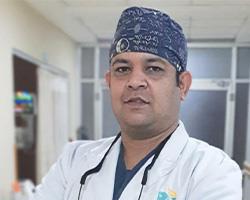Search Result: 4

Dr Bhabani Prasad Bordoloi
Consultant, GI Surgery MBBS, MS (General Surgery), Mch( GI Surgery)
Registration No
5340255
Language
English

7 years experience overall

Paschim Boragaon , Guwahati
WED, WED(04:00 PM-08:00 PM)

Dr Intekhab Alam
MBBS, M.Ch
Registration No
4329070
Language
English, অসমিয়া, বাংলা, हिंदी

8 years experience overall

Paschim Boragaon , Guwahati
MON- SAT, MON- SAT(10:00 AM-05:00 PM)

Dr Manuj Kumar Saikia
MBBS, MS, Mch
Registration No
4329071
Language
English, অসমিয়া, हिंदी

22 years experience overall

Paschim Boragaon , Guwahati
MON- SAT, MON- SAT(11:00 AM-05:00 PM)

Dr Digvyjay Sharma
MS, DNB (Gastro)
Registration No
4164507
Language
English, অসমিয়া, বাংলা, हिंदी

13 years experience overall

Zoo Road Guwahati , Guwahati
MON- SAT(08:00 AM-09:30 AM, 06:00 PM-08:00 PM)
Frequently Asked Questions for Heart Transplant in Guwahati
Neurological complications after heart transplant are rare but can occur. These complications may include stroke, cognitive changes, or seizures. Close monitoring and early detection of neurological issues are important to ensure appropriate treatment and management.
The immune system identifies the transplanted heart as foreign tissue and may try to attack it, leading to rejection. To prevent this, patients must take immunosuppressive medications that suppress the immune response, allowing the transplanted heart to function without rejection. Regular monitoring is essential to detect signs of rejection early.
Heart transplantation is a complex procedure associated with various challenges and risks. These include organ rejection, infection, side effects of immunosuppressive medications, complications during surgery, and the limited availability of donor hearts. Regular monitoring and follow-up care are crucial to manage these challenges effectively.
While a heart transplant can significantly impact a person’s physical health, there is no scientific evidence to suggest that it directly changes their personality. However, some patients may experience emotional and psychological changes due to the life-altering nature of the procedure.
While a heart transplant can significantly improve a patient’s quality of life, there are some disadvantages and potential risks associated with the procedure. These include the need for lifelong immunosuppressive medications, risk of organ rejection, surgical complications, side effects of medications, and potential infections.
Once a suitable donor heart becomes available, it is quickly transported to the recipient’s hospital using specialised transportation methods such as helicopters or chartered planes. The transportation team ensures that the organ remains preserved and viable until it reaches the recipient’s hospital for immediate transplantation.
After a heart transplant, patients must be on immunosuppressant medications to ensure that the new heart is not rejected. They also require regular follow-up appointments with their cardiologist, rehabilitation sessions, and lifestyle modifications such as a healthy diet, exercise, and avoiding certain activities that may strain the heart.
The duration of a heart transplant surgery can vary based on the case’s complexity. On average, the surgery can take anywhere from 4 to 8 hours. However, the entire process, including pre-operative evaluations and post-operative care, may span several weeks or months.
To be eligible for a heart transplant, patients must have end-stage heart failure that cannot be managed effectively with medication or other interventions. They should have no other life-threatening medical conditions or infections that could affect the success of the transplant. Age and overall health are also important factors considered during the evaluation process.
The recovery time for a heart transplant can vary from person to person. Generally, patients stay in the hospital for about 2-3 weeks after the surgery. However, complete recovery can take several months to a year, during which regular follow-up appointments and rehabilitation are necessary.
Before undergoing a heart transplant, patients undergo a thorough evaluation process to determine their eligibility. This process includes medical tests, imaging studies, and consultations with various specialists. Patients must also be mentally and emotionally prepared for the major surgery and potential lifestyle changes post-transplant.
A cardiothoracic surgeon, who specialises in surgical procedures of the heart and chest, performs heart transplant surgery. The surgeon works closely with a team of cardiologists and anaesthesiologists to ensure the procedure’s success.
There are two types of heart transplant surgeries: orthotopic and heterotopic. In an orthotopic transplant, the recipient’s damaged heart is completely removed and replaced with a healthy donor heart. In a heterotopic transplant, the recipient’s damaged heart is left in place, and the donor’s heart is connected alongside it.
The success rate of heart transplant surgery varies depending on several factors, such as the recipient’s overall health, age, and specific medical condition. It is generally considered a successful procedure, but individual outcomes may vary.
A heart transplant is a surgery wherein a diseased heart is replaced with a healthy heart from a deceased donor. This procedure is performed to increase the lifespan and improve patients’ quality of life with end-stage heart failure.
Other Specialities in Guwahati
- Best Urologist in Guwahati
- Best Pulmonologist in Guwahati
- Best General Physician in Guwahati
- Best Endocrinologist in Guwahati
- Best Cardiologist in Guwahati
- Best Oncologist in Guwahati
- Best Radiologist in Guwahati
- Best Orthopedics in Guwahati
- Best Hepatologist in Guwahati
- Best Gynecologist in Guwahati
- Best Dermatologist in Guwahati
- Best Gastroenterologist in Guwahati
- Best Psychologist in Guwahati
- Best Ent Specialist in Guwahati
- Best Nephrologist in Guwahati
- Best Rheumatologist in Guwahati
- Best Diabetologist in Guwahati
- Best Psychiatrist in Guwahati
- Best Neonatologist in Guwahati
- Best Dentist in Guwahati
- Best Dietitian in Guwahati
- Best Haematologist in Guwahati
- Best Pediatrics in Guwahati
- Best General Surgeon in Guwahati
Top Hospitals in India
- Hospitals in Ahmedabad
- Hospitals in Bangalore
- Hospitals in Bhubaneswar
- Hospitals in Bilaspur
- Hospitals in Chennai
- Hospitals in Delhi
- Hospitals in Guwahati
- Hospitals in Hyderabad
- Hospitals in Indore
- Hospitals in Kolkata
- Hospitals in Madurai
- Hospitals in Mumbai
- Hospitals in Mysore
- Hospitals in Nashik
- Hospitals in Noida
- Hospitals in Visakhapatnam
- Hospitals in Lucknow
- Hospitals in Bhopal
- Hospitals in Karur
- Hospitals in Kochi
- Hospitals in Nellore
- Hospitals in Trichy
- Hospitals in Kakinada
© Copyright 2024. Apollo Hospitals Group. All Rights Reserved.
 +91 8069991061
Book Appointment
+91 8069991061
Book Appointment






 Call Now
Call Now




